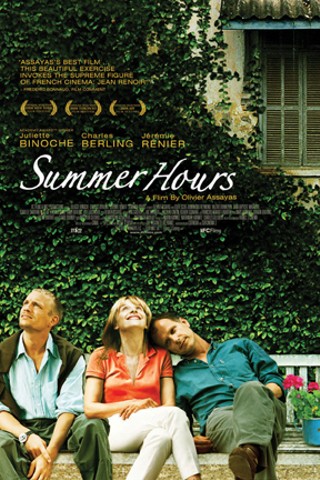I found the first hour or so of Summer Hours somewhat baffling. It's not that the plot and action weren't clear; it was just unclear to me why the film was made.
It begins with a family reunion in the countryside north of Paris. The 75-year-old matriarch, Hélène, has invited her three grown children, Adrienne, Frédéric and Jérémie, to what will be their last summer together. Hélène's grandchildren run and play in the fields while the adults express vague annoyance with each other. Adrienne (Juliette Binoche) is a designer, and she's French, so she's technically the most pretentious and condescending person on Earth. Her younger brother, Jérémie (Jérémie Renier), is in sales, so she treats him like he just cooked and roasted her dog. Her older brother, Frédéric (Charles Berling), is the only one of the children who still lives in France, making him sort of the protagonist.
The three siblings engage in the Gallic substitute for love, i.e., they smoke a lot while looking down on each other. Meanwhile, their children play in the background, enjoying the grand country home. But the home hides what the French call "a dark secret." It was here that Hélène, as a young woman, served as muse to her uncle, a famous painter and art collector. Now, with Hélène near death, she wants the children to be prepared to sell off the collection and give up the house that they've come to visit every summer since they were too small to light their own Gauloises.
The film is beautifully photographed, with lots of intimate two- and three-shots set off by the verdant countryside, and the actors all are excellent. Binoche is well-known to American audiences since she never hesitated to show her breasts in her earlier films, but Americans are less well-acquainted with Charles Berling, because it's harder to show your penis in American movies without making Jesus angry. Still, he's one of France's finest actors and gives a strongly understated performance.
Berling's Frédéric seems to be the focus of the film as he struggles with his mother's death and his intense desire to keep her collection intact and her home in possession of the family. Much of the conversation between the siblings revolves around this problem: Frédéric believes that his children should always be allowed to return to the home and see the art treasures, while the other siblings make "ka-ching" noises while euro signs appear in their eyes. Meanwhile, their kids don't play much of a role in the first hour of the film. When Frédéric shows them some of Hélène's precious paintings, they're unimpressed and run off to do the sorts of things that French 15-year-olds do (i.e., experience l'amour and have their medical needs attended to by the state).
The problem with this first hour is that no intense emotions really surface: They simmer, and there are hints of conflict and action, but everything remains civil, if tense, and the estate is resolved in a reasonably peaceful manner. So, again, I was unsure of the point; not all of life is worth making into a movie, and Summer Hours felt like stuff that characters in other movies did when the film wasn't rolling. It was sort of like if Batman had been about a pleasant summer that Bruce Wayne spent with his college chums. Essentially, it seems to be a movie about feelings and relationships, but they're fairly mild feelings, and realistic—but not tremendously interesting—relationships.
It's in the final third that things come together, and the film turns out to be about something else: the trajectory of objects. As the collection is moved about and displayed, it begins to leave the family behind. Frédéric, Jérémie and Adrienne become secondary characters in the story of the lives of a vase, an antique dresser, an art-nouveau desk and some wooden panels. It's then that the characters become interesting; in being diminished, their pathetic squabbling and selfish bickering acquire a completely different framework, and the entire film becomes inescapably sad, as though we were watching children play checkers while an atom bomb slowly fell on them from above.
The final sequence, a party at Hélène's house attended only by Frédéric's teenage children and their friends, then re-frames the film yet again, creating another perspective on the lives and objects that are disentangling themselves from the crumbling estate. A tremendous performance by Alice de Lencquesaing, as Frédéric's daughter Sylvie, puts an emotional exclamation point on the film and neatly points back to the arguments that had occupied its first hour.
For the end alone, Summer Hours is worth seeing, but director Olivier Assayas may have asked too much of the audience by spending so much time setting up the finale. The ending wouldn't have worked without this setup, and it's clear that the film was exactly as long as it had to be, but an indulgence of patience is required, and I fear most movie-goers aren't willing to give a director that much time to get to the point.











